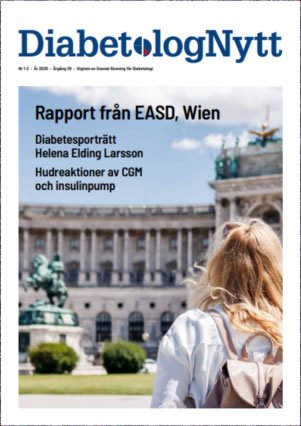|
Fifteen years after undergoing bariatric surgery, 30% of patients no longer had diabetes, but only 7% of patients who received usual care were in diabetes remission. These long-term findings from the Swedish Obese Subjects (SOS) prospective, matched-cohort study by Lars Sjöström, MD, from Sahlgrenska University Hospital, in Gothenburg, Sweden, and colleagues was published to coincide with the American Diabetes Association Conference in San Francisco. The study also shows that ”obese diabetics whose diabetes was of shorter duration or who had the greatest weight loss between the time of surgery and two years later were the most likely to have a sustained remission at 15 years. These patients likely had bariatric surgery before the failure of the insulin-producing cells of the pancreas was irreversible.” The SOS study enrolled 4047 obese patients in Sweden between 1987 and 2001. The current analysis looked at those who had diabetes at baseline: 260 patients who then received usual medical care and 343 patients who underwent bariatric surgery — vertical banded gastroplasty (227 patients), nonadjustable or adjustable banding (61 patients), or Roux-en-Y gastric bypass (55 patients). The patients had a mean age of about 50, a mean body mass index (BMI) of about 41, and about 60% were women. They had had diabetes for about 3 years. The researchers tracked microvascular complications of the kidney, eyes, and peripheral nerves and macrovascular complications — coronary heart disease, heart failure, stroke, and peripheral arterial disease — after a median of about 17 years. Diabetes remission was defined as having a blood glucose level below 110 mg/dL and not taking antidiabetic medication. Bariatric surgery was associated with higher diabetes-remission rates and weight loss compared with usual care, although these rates declined over time in both groups. Bariatric surgery was also associated with a significantly decreased risk for microvascular and macrovascular complications (hazard ratios, 0.43 and 0.74, respectively). Additional follow-up of newer studies is required to answer the question of which bariatric procedure is best for inducing long-term remission of diabetes, but those data will not be available for another 5 to 10 years.
Practice Pearls:
JAMA. 2014;311: 2297-2304, 2277-2278. |
Abstract
Importance Short-term studies show that bariatric surgery causes remission of diabetes. The long-term outcomes for remission and diabetes-related complications are not known.
Objectives To determine the long-term diabetes remission rates and the cumulative incidence of microvascular and macrovascular diabetes complications after bariatric surgery.
Design, Setting, and Participants The Swedish Obese Subjects (SOS) is a prospective matched cohort study conducted at 25 surgical departments and 480 primary health care centers in Sweden. Of patients recruited between September 1, 1987, and January 31, 2001, 260 of 2037 control patients and 343 of 2010 surgery patients had type 2 diabetes at baseline. For the current analysis, diabetes status was determined at SOS health examinations until May 22, 2013. Information on diabetes complications was obtained from national health registers until December 31, 2012. Participation rates at the 2-, 10-, and 15-year examinations were 81%, 58%, and 41% in the control group and 90%, 76%, and 47% in the surgery group. For diabetes assessment, the median follow-up time was 10 years (interquartile range [IQR], 2-15) and 10 years (IQR, 10-15) in the control and surgery groups, respectively. For diabetes complications, the median follow-up time was 17.6 years (IQR, 14.2-19.8) and 18.1 years (IQR, 15.2-21.1) in the control and surgery groups, respectively.
Interventions Adjustable or nonadjustable banding (n = 61), vertical banded gastroplasty (n = 227), or gastric bypass (n = 55) procedures were performed in the surgery group, and usual obesity and diabetes care was provided to the control group.
Main Outcomes and Measures Diabetes remission, relapse, and diabetes complications. Remission was defined as blood glucose <110 mg/dL and no diabetes medication.
Results The diabetes remission rate 2 years after surgery was 16.4% (95% CI, 11.7%-22.2%; 34/207) for control patients and 72.3% (95% CI, 66.9%-77.2%; 219/303) for bariatric surgery patients (odds ratio [OR], 13.3; 95% CI, 8.5-20.7; P < .001). At 15 years, the diabetes remission rates decreased to 6.5% (4/62) for control patients and to 30.4% (35/115) for bariatric surgery patients (OR, 6.3; 95% CI, 2.1-18.9; P < .001). With long-term follow-up, the cumulative incidence of microvascular complications was 41.8 per 1000 person-years (95% CI, 35.3-49.5) for control patients and 20.6 per 1000 person-years (95% CI, 17.0-24.9) in the surgery group (hazard ratio [HR], 0.44; 95% CI, 0.34-0.56; P < .001). Macrovascular complications were observed in 44.2 per 1000 person-years (95% CI, 37.5-52.1) in control patients and 31.7 per 1000 person-years (95% CI, 27.0-37.2) for the surgical group (HR, 0.68; 95% CI, 0.54-0.85; P = .001).
Conclusions and Relevance In this very long-term follow-up observational study of obese patients with type 2 diabetes, bariatric surgery was associated with more frequent diabetes remission and fewer complications than usual care. These findings require confirmation in randomized trials.
Trial Registration clinicaltrials.gov Identifier: NCT01479452
EDITORIAL
jama.jamanetwork.com/article.aspx?articleid=1878701
Nyhetsinfo
www red DiabetologNytt

